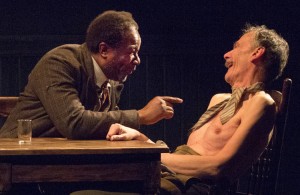After seeing the Goodman Theatre revival of The Iceman Cometh in Brooklyn, it’s tempting to wonder what Eugene O’Neill would have thought of purveyors of the modern 90-minute intermissionless play. Sloth-ridden pikers, perhaps? O’Neill’s late masterpiece runs four hours and 45 minutes at BAM, and it is surely one of the bleakest plays ever written. Don’t let that put you off, however. Robert Falls’s magnificent production may require a marathon sitting, but it’s worth it.
The setting is 1912, in a combination saloon and rooming house filled with those who have hit rock bottom. The proprietor is Stephen Ouimette’s cantankerous Harry Hope (O’Neill’s sense of irony is not subtle), and the denizens are a collection of drunks, waking up gradually in the gloom. At first Natasha Katz’s remarkable lighting barely registers; then it slowly reveals the tables of inebriates.
The group is awaiting Theodore “Hickey” Hickman (Nathan Lane), whose annual arrival for Harry’s birthday party is imminent. Among those on hand are ex-anarchist Larry Slade (Brian Dennehy); Hugo, a Russian-accented anarchist (Lee Wilkof); Ed Mosher (Larry Heumann Jr.), who is Harry’s brother-in-law and worked for the circus; and Joe Mott (John Douglas Thompson), an ex-gambler on the skids who cleans the bar. Other characters include two Boer War veterans from opposing sides and a correspondent in that war; two bartenders; and a trio of self-styled “tarts.”
During the next 48 hours the last vestiges of hope for any of them are stripped away. Before Hickey’s arrival the burnt-out Larry is approached by Don Parritt (Patrick Andrews), a young man whose mother is a firebrand anarchist more devoted to the movement than to him; Don has always looked up to Larry as a father, but now Larry wants Don to take a powder. Someone has sold out the movement, and Don’s mother has been arrested.
When Hickey shows up, he delivers a shock to the group. He’s no longer a drinker. He has faced himself and he has become an evangelist for truth-telling. The Hickey part doesn’t seem tailored to Nathan Lane’s acknowledged comic brilliance, but Lane not only finds comedy where it isn’t apparent, he proves himself a powerful dramatic actor (to be fair, he has done dramatic parts before, but nothing compared to this). The evangelist’s fire and the do-gooder’s brass, the glad-hander’s cheer and optimism—Lane has them all. He jokes around as a salesman must, and yet he also excoriates the others’ “pipe dreams.” You’ll be sick of that phrase by the end of the evening, with “take a hop off the fire escape” a close second—O’Neill overwrites, but he also supplies plenty of humor, and even the repetition, while trying one’s patience, gathers a cumulative, relentless force.



